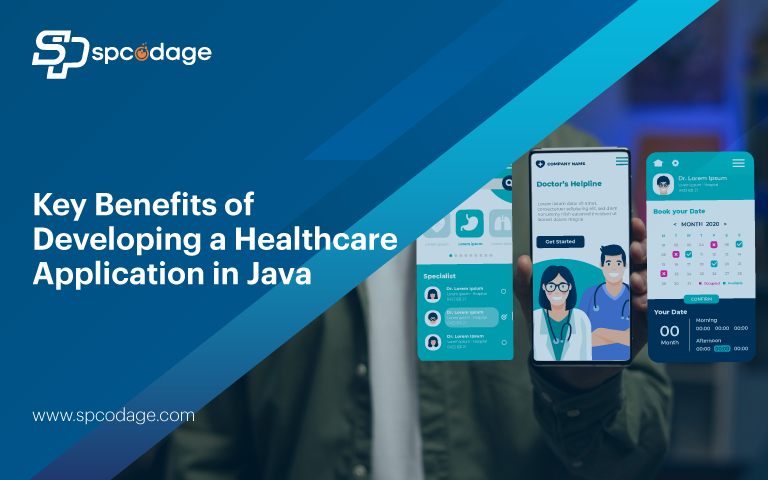Java has profoundly influenced the healthcare sector by providing technologies that can support the creation of secure, efficient, and dependable applications that enhance patient care.
How Java Transforms Data Management in Healthcare Applications
Given its flexibility and capacity to address Big Data, Java is an excellent choice for implementing healthcare applications. Java also has a fast data handling mechanism that will create an efficient framework for sharing information for those in healthcare hence improving patient care.
If implemented well, Java applications in healthcare can easily be made to serve the requirements of any healthcare organization and can work better than most systems. Java’s compatibility with other systems would also be another benefit since the software could easily interact with systems such as other departments, or healthcare facilities.
Enhancing Healthcare Apps User Experience with Java
In healthcare applications, user experience is significant because patients and other caretakers of health facilities require easily navigable interfaces. Due to Java’s development ecosystem, a wide variety of libraries and frameworks are available to help developers design compelling, in-depth, and appealing user interfaces, which boosts usability.
Anyone who has worked on Java understands its concept of ‘‘write once, run anywhere’’ which increases the chances of healthcare applications developed with the help of Java to run on different platforms and devices regarding their usability. This flexibility is essential in the healthcare sector since professionals have to use different locations and devices to gain access to patient records.
Best Practices for Developing Secure Healthcare Apps with Java
The integrity of information is very important in the healthcare sector as patient records have special access requirements. Java is well equipped with good amounts of security instrumentation and there are many third-party classes available for enhancing security which makes Java preferable for developing efficient healthcare applications.
By acting on the industry’s best practices like maintaining secure authentication methods, encrypting the app data, and ensuring the app has regular security patches, developers can offer healthcare applications that protect the patient’s data and pass the HIPAA guidelines. Java’s focus on backward compatibility and extensive support facilitates the protection of healthcare applications as well as their update in the long run.
Advantages of Using Java for Healthcare Web Applications
1.Robust and Secure: Java’s strong type checking, automatic memory management, and extensive security features make it a reliable choice for developing healthcare applications.
2.Platform Independence: Java’s “write once, run anywhere” principle allows healthcare applications to run on various platforms and devices, ensuring cross-platform compatibility.
3.Scalability and Performance: Java’s scalability and performance make it suitable for developing healthcare applications that need to handle large amounts of data and support multiple users simultaneously.
4.Extensive Libraries and Frameworks: Java’s vast ecosystem of libraries and frameworks provides developers with a wide range of tools and resources for building healthcare applications efficiently.
5.Community Support and Resources: Java has a large and active community of developers, providing extensive support, resources, and documentation for building healthcare applications.
6.Integration Capabilities: Java’s ability to integrate with various systems and technologies makes it easier to develop healthcare applications that can communicate with other systems and devices.
7.Continuous Updates and Improvements: Java’s ongoing development and updates ensure that healthcare applications built using Java remain current and benefit from the latest advancements in the language and its ecosystem.
8.Cost-Effective Solution: Java’s open-source nature and the availability of free development tools make it a cost-effective choice for developing healthcare applications, especially for startups and small organizations.
Evolution of Healthcare Web Application Development in 2024
1.AI-driven Personalized Medicine:
Artificial intelligence is revolutionizing treatment plans by tailoring them to the unique medical profiles of individual patients.
2.Virtual Care and Telemedicine:
Telemedicine services and virtual consultations are expanding, especially in remote areas. Advanced technology is driving the growth of virtual care within the healthcare sector, with telemedicine playing a crucial role in web application development.
3.Blockchain for Secure Data Management:
Blockchain technology enhances the security and integrity of medical data, offering an effective solution for data management in healthcare applications.
4.Internet of Things-enabled Medical Devices:
The Internet of Things (IoT) facilitates remote patient monitoring and interconnected healthcare devices, significantly advancing the development of medical technology.
5.Wearable Technology Integration:
Wearable devices provide personalized health monitoring and predictive analytics through real-time data collection. As technology advances, wearable tech is becoming increasingly influential.
Conclusion
Java Development Solutions & Services can be considered a breakthrough in the healthcare industry since they help to design safe, effective, and easy-to-use applications that can help healthcare professionals provide patients with better care while addressing various organizational issues. Through the application of Java specification, rich features available in the language, broad libraries, and support from the Java community, healthcare organizations can develop their applications to suit their needs.



